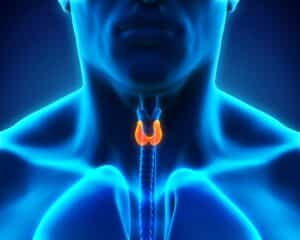Elder Care in Spring Valley, TX
 The thyroid is a hormone-producing gland that is located in the neck. It produces a thyroid hormone that affects the way the body uses energy. When the thyroid produces too little of this hormone, it is called hypothyroidism. Hypothyroidism is a very common condition among women aged 60 and older and it has a tendency to run in families. Hypothyroidism can cause unpleasant symptoms which can be easily be confused with the natural symptoms of aging, so in many cases it gets left untreated. Fortunately, hypothyroid is manageable and treatable so it is important for elderly adults who believe that they may have a thyroid problem to make an appointment with their doctor. Here is some useful information about hypothyroidism for elderly adults and their caregivers.
The thyroid is a hormone-producing gland that is located in the neck. It produces a thyroid hormone that affects the way the body uses energy. When the thyroid produces too little of this hormone, it is called hypothyroidism. Hypothyroidism is a very common condition among women aged 60 and older and it has a tendency to run in families. Hypothyroidism can cause unpleasant symptoms which can be easily be confused with the natural symptoms of aging, so in many cases it gets left untreated. Fortunately, hypothyroid is manageable and treatable so it is important for elderly adults who believe that they may have a thyroid problem to make an appointment with their doctor. Here is some useful information about hypothyroidism for elderly adults and their caregivers.
What are the symptoms of hypothyroidism?
Many of the symptoms of hypothyroidism overlap with the natural symptoms of aging, so they can be confusing to identify. The symptoms of hypothyroidism include dry skin, brittle nails, fatigue and weakness, depression, constipation, memory problems, and not being able to tolerate cold temperatures. Some, but not all, people affected by hypothyroidism will experience weight gain, an enlarged thyroid gland, swelling in different parts of the body, hoarseness, and muscle aches and cramps. Symptoms of hypothyroidism may go unnoticed at first, but they can worsen with age.
What causes hypothyroidism?
There are many factors that lead to hypothyroidism. Women are more susceptible to thyroid diseases than men. There is a genetic component to hypothyroidism and those who have a family history of the disease are more likely to get it themselves. Chronic medical conditions such as diabetes can also lead to hypothyroidism as can some bacterial infections and medications.
How is hypothyroidism treated?
Determining possible causes of hypothyroidism is the first step in treating it effectively. If it is caused by a bacterial infection, that infection can be treated first. Similarly, if it is caused by medications, a doctor may recommend changing the medications. Hypothyroidism is most often treated with thyroid hormone medicine, which usually needs to be taken long term. Caregivers of elderly adults with hypothyroidism can help them to take their medicine correctly and keep track of any symptoms they notice. It is also very important for elderly adults with hypothyroidism to go to their doctor’s office for regular check ups.
Source:
http://www.webmd.com/women/tc/hypothyroidism-topic-overview
If you or an aging loved one are considering elder care in Spring Valley, TX, please call the caring staff at At Your Side Home Care. We will answer all of your senior care questions. Call today: (832) 271-1600.
Our Certified Nurse Aides, 24-Hour Live-in Assistants and Home Health Aides are available 24 hours a day, 365 days a year. We also provide the security and confidence of 24-hour Telephone Assistance, so fast, reliable help is always available when it's needed. To learn more about our homecare services see our homecare services page.
Different people need different levels of homecare. To meet the requirements of our clients, At Your Side Homecare maintains consistent staffing levels of caring professionals. Homecare service is available for as little as a few hours a week, or as many as 24 hours a day, seven days a week
- Who Needs Respite Care? - March 28, 2025
- How Can Families Know What Seniors with Dementia Need? - March 28, 2025
- Seven Lesser-known Dementia Safety Tips - March 21, 2025



